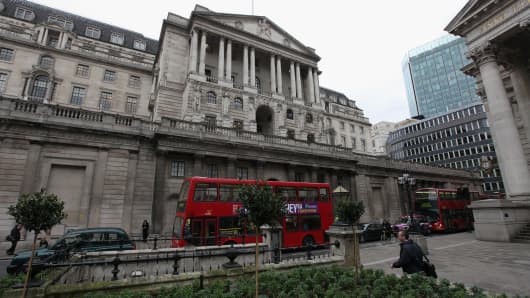The Bank of England kept its main interest rate unchanged on Thursday but warned that rising bond yields would weigh on its current outlook for growth, sounding a dovish tone which led to a sharp weakening of the sterling against the dollar.
In governor Mark Carney's first ever monetary policy committee (MPC) meeting since taking over, the BoE kept the main interest rate unchanged at a record low 0.5 percent. It also said it won't add to its £375 billion ($571.6 billion) quantitative easing (QE) program.
However, the announcement coincided with the release of a statement from the bank, a change from previous meetings, which led to sharp drop in sterling and a rally in London stocks.
"In the United Kingdom, there have been further signs that a recovery is in train, although it remains weak by historical standards and a degree of slack is expected to persist for some time," the bank said in the statement.
(Read More: Promising UK Data Greet Carney on First Day)
It also noted that sharp spikes in interest rates globally and the volatility seen in stock markets wasn't warranted and would weigh on a previous outlook in May for growth and inflation. Sterling fell from 1.52 against the dollar to just above 1.50 shortly after the rate decision.
"Carney shows who is boss at the BOE...Carney and co. at the Bank of England are obviously concerned about the rise in Gilt yields. The 10-year yield has risen to its highest level since October 2011 in recent weeks, and this was the chief economic risk included in the statement," Kathleen Brooks, a research director at Forex.com said in a note.
(Read More: Carney Takes Bank of England Reins Amid Bond 'Carnage')
"The Bank stated that 'the implied rise in the expected future path of the Bank Rate was not warranted by the recent developments in the domestic economy'. This is a clear hint that the BoE could be on the cusp of more asset purchases in an attempt to bring down rates."





